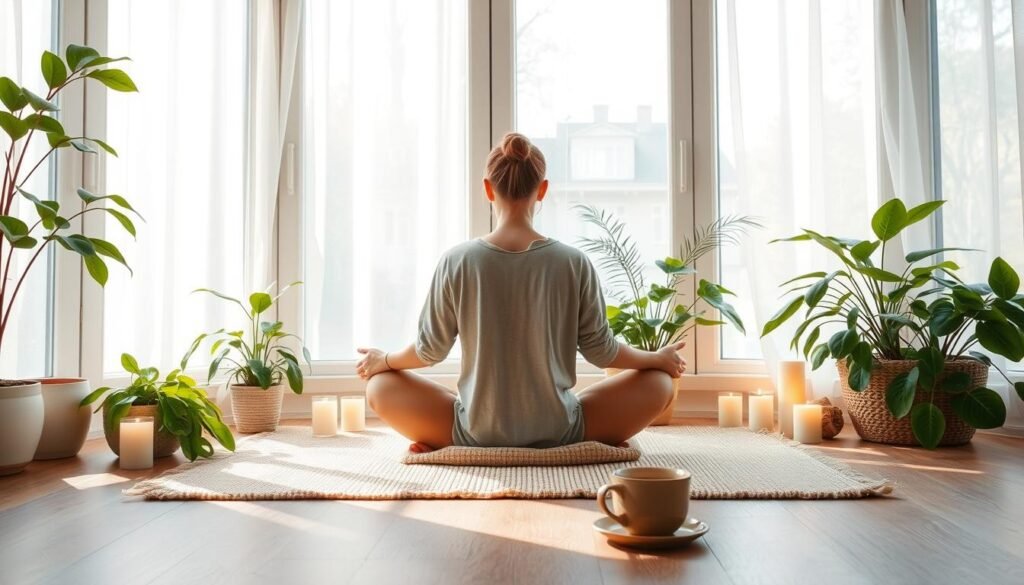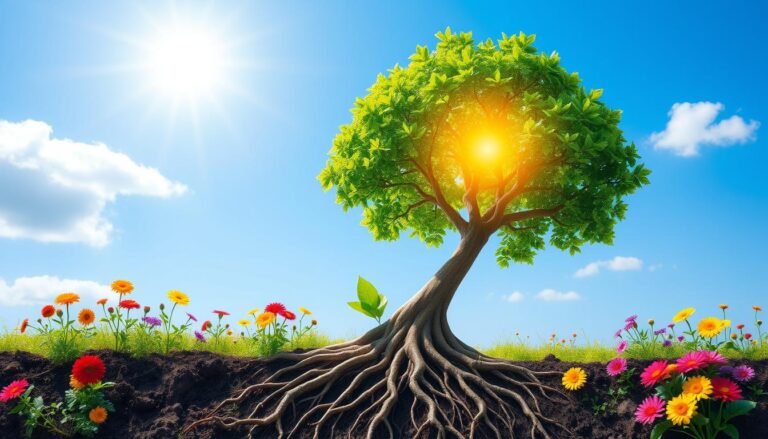5 Mindfulness Practices to Start the New Year with a Clear Mind
Some links on this page are affiliate links. This means we may earn a commission at no additional cost to you if you click through and make a purchase. Thank you for your support!
As the clock strikes midnight on New Year’s Eve, a sense of excitement fills the air. It’s a time for reflection and setting new goals. This year, let’s focus on mindfulness – being present and aware in the moment.
I’ve found mindfulness to be a game-changer in my life. It helped me cut down on alcohol and made my New Year’s celebrations more meaningful. Mindfulness improves our mental, emotional, and physical health. It helps us face the new year with clarity and joy.
Key Takeaways
- Embrace the power of mindfulness to start your new year with clarity and purpose.
- Discover five transformative mindfulness practices to reduce stress and welcome fresh beginnings.
- Learn how to set intentional foundations, create daily rituals, and integrate mindfulness into your life.
- Explore the science-backed benefits of mindfulness for mental, emotional, and physical well-being.
- Unlock a more balanced and fulfilling year ahead by tapping into the present moment.
Understanding the Power of Mindful Beginnings
Starting a new year is exciting and empowering. It’s a chance to begin with a clear mind and focus. Mindfulness helps us stay in the present moment, improving our mental clarity and setting a purposeful path for the year.
Benefits of Starting Fresh with Mindfulness
Mindfulness at the start of the year brings many benefits. It reduces stress and anxiety and improves focus and decision-making. It makes us more self-aware and emotionally resilient, helping us face the year with clarity.
How Mindfulness Shapes Mental Clarity
Mindfulness keeps us in the present, away from past regrets or future fears. This self-awareness helps us make better decisions and handle challenges calmly. It’s essential for setting meaningful goals and resolutions.
The Science Behind New Year Mindfulness
Studies show mindfulness greatly benefits our brains and well-being. It can change our brain structure, improving emotional control and memory. It also reduces stress and boosts focus, laying a strong foundation for the new year.
“Let the beauty of what you love be what you do.” – Rumi
Welcoming the new year with mindfulness is transformative. It prepares us for a year of mental clarity, emotional balance, and gratitude. The science proves mindfulness is key to starting the year focused and clear.
Setting Intentional Foundations for the Year Ahead
Starting a new year is a great time to look back and plan ahead. Mindfulness helps us be clear, follow our values, and stay grounded. It prepares us for the year’s ups and downs.
Studies show that a growth mindset makes us 33% more likely to keep going, even when things get tough. Mindfulness helps us grow strong and make the most of the new year.
Adding mindfulness practices to our daily lives can cut stress by up to 27%. This is key when setting goals for the year. It keeps our minds clear and focused. With self-care, we can work better and feel more satisfied in our jobs by 20%.
Being adaptable and grateful is also important. Companies that adapt well do 50% better in tough markets. People who are thankful feel 15% better mentally and emotionally.
Let’s use mindfulness to build a strong start for the new year. By staying true to ourselves and celebrating our wins, we can make this year fulfilling and meaningful.

Setting goals well means being ready for obstacles and staying kind to ourselves. With mindfulness, we can lay a solid foundation for success in the coming year.
Essential mindfulness practices New Year transformation
Starting a new year is a great time to try mindfulness. It can bring mental clarity and well-being into your life. Whether you’re new to meditation or have been doing it for a while, these practices can help you live more mindfully.
Morning Meditation Routines
Starting your day with meditation can help you focus and feel more present. Try 5-10 minutes of quiet time, breathing exercises, or guided visualizations. As you get more comfortable, you can meditate for longer periods.
Breathwork Techniques for Clarity
Breathwork can reduce stress and improve your mental clarity. Try different breathing patterns like the 4-7-8 method or alternate nostril breathing. Finding the right technique can greatly improve your mood and energy.
Mindful Journaling Practices
Mindful journaling can be a game-changer for the new year. Spend a few minutes each day writing about your experiences, feelings, and goals. Use prompts to help you reflect on gratitude and setting intentions. Writing down your thoughts can give you deeper insights and clarity.
Adding these mindfulness practices to your daily routine can lead to a more focused and balanced year. Remember, the key is to be consistent. Be patient with yourself and enjoy the journey.
Creating Your Daily Mindfulness Ritual
Starting a new year is a great time to create a daily mindfulness ritual. This ritual can help you grow and feel better all year. By adding mindfulness to your daily life, you can live in the moment and feel more clear and kind.
Starting your day with a mindful new year can be powerful. Just 5-10 minutes of quiet reflection in the morning can change your day. Try different daily routine methods, like focusing on your breath or guided visualizations, to find what works best for you.
Adding mindful breathing exercises to your day can make you feel calmer and more focused. Take short breaks to breathe deeply and stay present. These moments can help you deal with daily life more smoothly and with kindness.
Keeping a mindful journal is also a great habit. Spend a few minutes each day writing about your thoughts, feelings, and insights. It’s a way to reflect on the past year, plan for the future, and understand yourself better.
Being consistent is key to a successful daily mindfulness ritual. By making these practices a regular part of your day, you’ll see big changes in your mind, heart, and body. Welcome the mindful new year and start a journey of growth and self-discovery through mindfulness.

“The true essence of a human being is found in the capacity to grow, to become more, to love, to create, to transcend.” – Marianne Williamson
Mindful Body Awareness and Physical Well-being
Mindfulness is not just for the mind. It also improves our physical health. By paying attention to our bodies, we can feel a deep connection to our overall wellness. This includes activities like movement meditation and mindful eating.
These practices can change how we feel and improve our emotional and physical health.
Movement Meditation Techniques
Mindful movement, like gentle yoga or tai chi, helps reduce anxiety and boosts self-kindness. It combines breath with movement to calm the mind and nourish the body. Try different mindful movements to find what works best for you.
Body Scanning Practice
Body scanning is a simple yet powerful mindfulness technique. It helps you focus on your body, noticing any feelings or sensations. This practice strengthens your mind-body connection, reduces stress, and improves your relationship with your body.
Mindful Eating Habits
Mindful eating changes how we view food. It helps us enjoy each bite and listen to our hunger and fullness signals. By being more mindful, we make healthier choices that support our wellness. Try eating in silence or using all your senses to enjoy your food.

Choosing mindfulness as a lifestyle can greatly benefit your health. By adding these mindful moments to your day, you start a journey of self-discovery and positive change. This nourishes your body, mind, and spirit.
Emotional Balance Through Present Moment Awareness
Starting a new year, we focus on emotional balance and resilience. Mindfulness is a key tool. It helps us stay in the moment, without worrying about the past or future. This way, we can handle negative thoughts and habits that harm our happiness.
Mindfulness meditation fights worry, fear, and anxiety. It trains our minds to observe thoughts and feelings without getting lost in them. This approach, as Victor Frankl said, helps us make better choices. Simple steps like mindful breathing can make mindfulness a part of our daily life.
But mindfulness isn’t just about meditation. Activities like yoga, tai chi, and qigong also help. Taking breaks from digital devices and reflecting on our day can boost our self-awareness and goal-setting for the year.
Mindfulness is powerful for emotional balance, even in chaotic times. By being kind to our thoughts and feelings, we can manage stress and improve our mood. As we start the new year, let’s use mindfulness to live a more balanced and joyful life.

| Mindfulness Practice | Benefits |
|---|---|
| Meditation | Reduces worry, fear, and anxiety; Promotes a sense of calm and well-being |
| Yoga, Tai Chi, Qigong | Enhances self-awareness and emotional balance |
| Digital Detox | Aids in the process of mindfulness by reducing digital distractions |
| Reflection and Intention-Setting | Enhances self-awareness and supports positive goal-setting for the year ahead |
By practicing mindfulness, we can find emotional balance. We can manage negative thoughts and habits. This leads to more happiness and inner peace every day, not just on New Year’s Day.
Cultivating Gratitude and Self-Compassion
Starting a new year is a great time to focus on gratitude and self-compassion. These tools help us grow and find happiness. By looking at the good in life and treating ourselves kindly, we can change for the better.
Daily Gratitude Exercises
Doing daily gratitude exercises can really help your mind and heart. Studies show that feeling thankful can cut down anxiety and depression by 55%. Try to think of three things you’re thankful for each morning, or write them down in a journal.
Self-Compassion Meditation
Self-compassion is key to caring for ourselves and growing. About 70% of people dealing with mental health issues find self-compassion helpful. Try self-compassion meditation to be kinder to yourself. It helps you believe in yourself more and move forward.
Letting Go of Past Regrets
Mindfulness helps us let go of past regrets and forgive ourselves. Holding onto past mistakes can hold us back. Mindful practices help us face our past, be kind to ourselves, and move forward with purpose.
“The greatest gift you can give yourself is the habit of cultivating gratitude.” – Oprah Winfrey

By doing daily gratitude, self-compassion meditation, and letting go of regrets, you can change your life. Remember, growing is a lifelong journey. Be patient, celebrate your wins, and enjoy the journey to a more mindful life.
ALSO READ: Mindset Shifts to Make 2025 Your Best Year Yet
Integrating Mindfulness into Daily Activities
As we start the new year, let’s dive into mindful goal setting and finding our purpose. Mindfulness isn’t just for quiet moments. It can turn everyday tasks into chances for present moment awareness and self-compassion practices.
To make new year resolutions stick, we need to add mindfulness to our daily lives. Try deep breathing on your morning commute, feel your body while washing dishes, or notice your thoughts at work.
- Incorporate mindful breathing into your daily activities, such as during your commute or while waiting in line.
- Practice mindful walking by paying attention to the sensations in your body as you move.
- Engage in mindful eating by savoring each bite and being fully present during meals.
- Set reminders to take mindful breaks throughout the day, even if it’s just for a few minutes.
By making mindfulness a part of your daily life, you’ll grow in present moment awareness. You’ll see the benefits of mindfulness beyond meditation. Use everyday moments for growth, self-discovery, and self-compassion practices.
“Mindfulness is not about clearing your head or getting rid of thoughts. It’s about changing your relationship to them – observing them with curiosity and compassion rather than judgment or avoidance.” – Tara Brach
ALSO READ: How to Set Powerful Intentions for a Motivated New Year
Building Sustainable Mindfulness Habits
As the excitement of the new year fades, it’s key to keep up mindfulness habits. Set achievable goals, tackle common obstacles, and track your progress. This way, mindfulness can become a daily part of your life.
Creating Achievable Goals
Setting realistic goals is the first step to lasting mindfulness habits. Identify what you want to improve, like stress reduction exercises or mindful meditation. Break big goals into smaller steps. This lets you celebrate your wins.
Overcoming Practice Obstacles
Sticking to mindfulness is hard, but you can overcome obstacles. Find time in your busy life or deal with frustration. Try mindfulness exercises for beginners or new mindfulness apps to keep it interesting.
Measuring Progress
It’s important to track your progress to stay motivated. Use a mindfulness journal or set goals like meditation sessions. Note how you feel before and after. Celebrate every success to keep your practice positive.
By focusing on building sustainable mindfulness habits, you can create a lifelong practice. It will support your well-being and help you through life’s challenges.
“The secret of change is to focus all of your energy, not on fighting the old, but on building the new.” – Socrates
Digital Mindfulness and Technology Balance
In the new year, it’s key to focus on digital mindfulness and balance with tech. We need to use technology wisely to improve our lives, not control them. This balance is vital for our well-being.
Being mindful of tech’s impact on our emotions and thoughts is important. Setting limits on device use and creating tech-free areas helps us stay present. This leads to clearer minds and a more intentional life.
- Practice regular digital detoxes to disconnect from technology and recharge
- Designate specific times and spaces as tech-free, such as during meals or before bedtime
- Utilize mindfulness apps and digital tools that support your self-reflection and conscious goal-setting
Using social media mindfully can also boost our emotional health. By choosing positive content and interactions, we create a supportive online space. This helps us grow and feel connected.
| Mindful Tech Practices | Benefits |
|---|---|
| Limiting screen time | Reduced stress and anxiety, improved focus and productivity |
| Mindful social media usage | Enhanced emotional regulation, stronger relationships, and increased self-awareness |
| Incorporating mindfulness apps | Improved stress reduction techniques, self-reflection exercises, and intentional living |
By embracing digital mindfulness and finding a balance with tech, we can use digital tools for growth. This approach supports our emotional health and well-being in the new year and beyond.
“The true power of technology lies in its ability to enhance our lives, not dominate them. By practicing digital mindfulness, we can unlock the transformative potential of technology and create a more intentional, balanced, and fulfilling existence.”
Conclusion
As we wrap up our look at mindfulness for the new year, we’ve seen its huge impact. Morning meditation, mindful journaling, and body awareness are just a few tools to help you start 2023 with clarity and focus.
Being mindful is a journey, not a quick fix. Be kind to yourself and keep at it. With time, you’ll see the good changes in your life, like better sleep and emotional balance.
Try out different mindful rituals to find what works best for you. There’s no single right way to be mindful. Start this journey with an open heart and mind, and you’ll see the positive changes it brings.
ALSO READ: How to Create a Realistic New Year’s Fitness Plan for Busy Schedules
FAQ
What are the key benefits of starting the new year with mindfulness practices?
Mindfulness helps you become more aware and less stressed. It boosts your mental clarity and focus. This way, you can start the new year with purpose and intention.
How can mindfulness techniques support intentional goal-setting for the new year?
Mindfulness helps you set clear goals that align with your values. Morning meditation, breathwork, and journaling improve your focus. They help you set meaningful goals and stay on track.
What are some essential mindfulness practices for new year transformation?
Key practices include morning meditation, breathwork, and journaling. They help you focus each day, manage stress, and reflect on your experiences. This sets the stage for your goals in the new year.
How can I integrate a daily mindfulness ritual into my routine?
Start with short meditation, mindful breathing, and pauses. These practices make mindfulness a part of your daily life. Regular practice leads to lasting positive changes.
What is the connection between mindfulness and physical well-being?
Mindfulness practices like movement meditation and mindful eating improve your health. They reduce stress and enhance your body awareness. This way, you nourish your body and appreciate your health more.
How can mindfulness foster emotional balance and resilience?
Mindfulness helps you manage emotions and stay present. It reduces anxiety and regrets. This way, you can face challenges and stay peaceful.
What are the benefits of cultivating gratitude and self-compassion?
Daily gratitude and self-compassion meditation shift your focus to the positive. They help you grow, be happy, and forgive yourself. This prepares you for a positive new year.
How can I integrate mindfulness into my everyday activities?
Bring mindfulness to daily tasks like commuting or chores. This turns ordinary moments into chances for awareness. It makes your life more fulfilling.
What strategies can I use to build sustainable mindfulness habits?
Start with achievable goals and overcome obstacles. Celebrate your progress. This keeps your mindfulness journey consistent and meaningful.
How can I create a healthy balance with technology in the new year?
Use digital mindfulness to set tech boundaries and create tech-free zones. Mindfulness apps can also help. This keeps technology from overwhelming you and lets you stay present.







